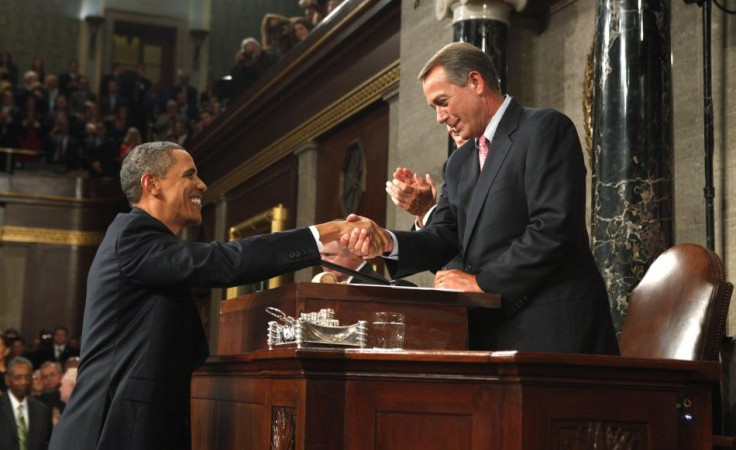Obama Speech: Republicans Strike a Conciliatory Tone, Urging Compromise to Create Jobs

In statements issued after President Obama's jobs speech on Thursday night, Republican leaders struck a note very different from the uncompromising, line-in-the-sand rhetoric that has dominated economic discussions for the past several months.
Criticisms of Obama and fundamental differences of opinion were still evident, but there were also gestures at conciliation and compromise: virtues that the acrimonious debate in July over raising the debt ceiling had seemed to destroy.
House Speaker John Boehner's office released a short statement Thursday night in which he promised that Congress would consider the president's suggestions and asked that Obama consider Republicans' suggestions in exchange.
The proposals the president outlined tonight merit consideration. We hope he gives serious consideration to our ideas as well, Boehner said. It's my hope that we can work together to end the uncertainty facing families and small businesses, and create a better environment for long-term economic growth and private-sector job creation.
In a brief interview with Bloomberg TV after the speech, House Majority Leader Eric Cantor reacted similarly, saying that while Republicans and Democrats fundamentally disagree on many job-creation proposals, Congress shouldn't let the differences get in the way of where we can work together.
Cantor said Republicans would support anything that can provide incentives for entrepreneurs to put capital to work. He referenced a particular Republican plan, released in 2009, that would have reduced taxes for small businesses, and said that in listening to Obama's speech, he heard some proposals that could very well match our goals toward that end.
While Cantor rejected certain aspects of Obama's jobs plan -- including, once again, the president's call to end tax breaks for the wealthiest Americans -- the overall tone of his and Boehner's responses was conciliatory. It was a far cry from the bitter, accusatory language that characterized the debt-ceiling debate, in which many Republicans rejected revenue increases sight unseen and, in one meeting, Obama said he would not back down even if it cost him re-election and warned Cantor not to call his bluff.
Polls showed that voters of all political stripes were disgusted with the gridlock between the president and Congress. Both sides' approval ratings fell, with congressional ratings dropping to some of the lowest levels ever. There is still a gaping divide between Democrats and Republicans, and the climate of accusations and scathing rhetoric remains to a large extent, but it seems leaders on both sides have at least learned some lessons.
Cantor tempered his conciliatory remarks with restatements of Republicans' opposition to tax increases, and he was quick to emphasize that he would not accept an all-or-nothing jobs plan that Obama told Congress to either take or leave -- the type of proposal Obama indicated in his speech by saying repeatedly that Congress should pass his plan right away.
The reality is, people can disagree. Republicans and Democrats are not going to agree on everything, Cantor said. Set aside this notion the president suggested that it's a take-it-or-leave-it package. We can work on the areas of commonality.
Minnesota Rep. Michele Bachmann was the only Republican to give a formal, full-length rebuttal to the speech, and her tone was less conciliatory than Boehner's or Cantor's. She did say she would embrace tax breaks for small businesses, adding, I would love to be able to work with the president to be able to turn the economy around. Unlike Boehner and Cantor, however, she did not say that Obama's suggestions merited consideration on the whole.
Naturally, as a presidential candidate, Bachmann had more to gain from vilifying Obama than did Boehner and Cantor, who are congressional leaders and have to work with the president every day. She was also looking to revive her campaign, which has sunk since Texas Gov. Rick Perry entered the race, and to regain the loyalty of her Tea Party base.
So Bachmann dismissed Obama's plan, saying it offered nothing new -- an accusation also made by Rep. Jim Jordan of Ohio, who compared the president's speech sarcastically to the movie Groundhog Day. She also reiterated that she did not believe the government was in a position to create jobs at all. The only way to reduce unemployment, she said, is through free-market, pro-growth policies. She did not elaborate on any specific policies that she would support.
But she was pretty much alone in her absolutist stance. It did not hurt that Obama's proposals were largely uncontroversial -- some of them, like an extended payroll tax cut, have even gained Republican support already -- so most Republicans did not have an incentive to disagree. Cantor did reject outright Obama's repeated call to eliminate tax breaks for wealthy individuals -- Republicans don't believe in raising taxes for anybody, he told Bloomberg TV -- but overall, he was cordial and indicated a willingness to work across party lines to substantively address the issue of unemployment.
Whether that spirit of bipartisan cooperation will last is an open question. Certainly, as the 2012 elections draw nearer, Republicans will have a renewed incentive to distance themselves from Obama. But for now, Thursday night's speech seems to have been a relative success for both sides.
© Copyright IBTimes 2024. All rights reserved.











